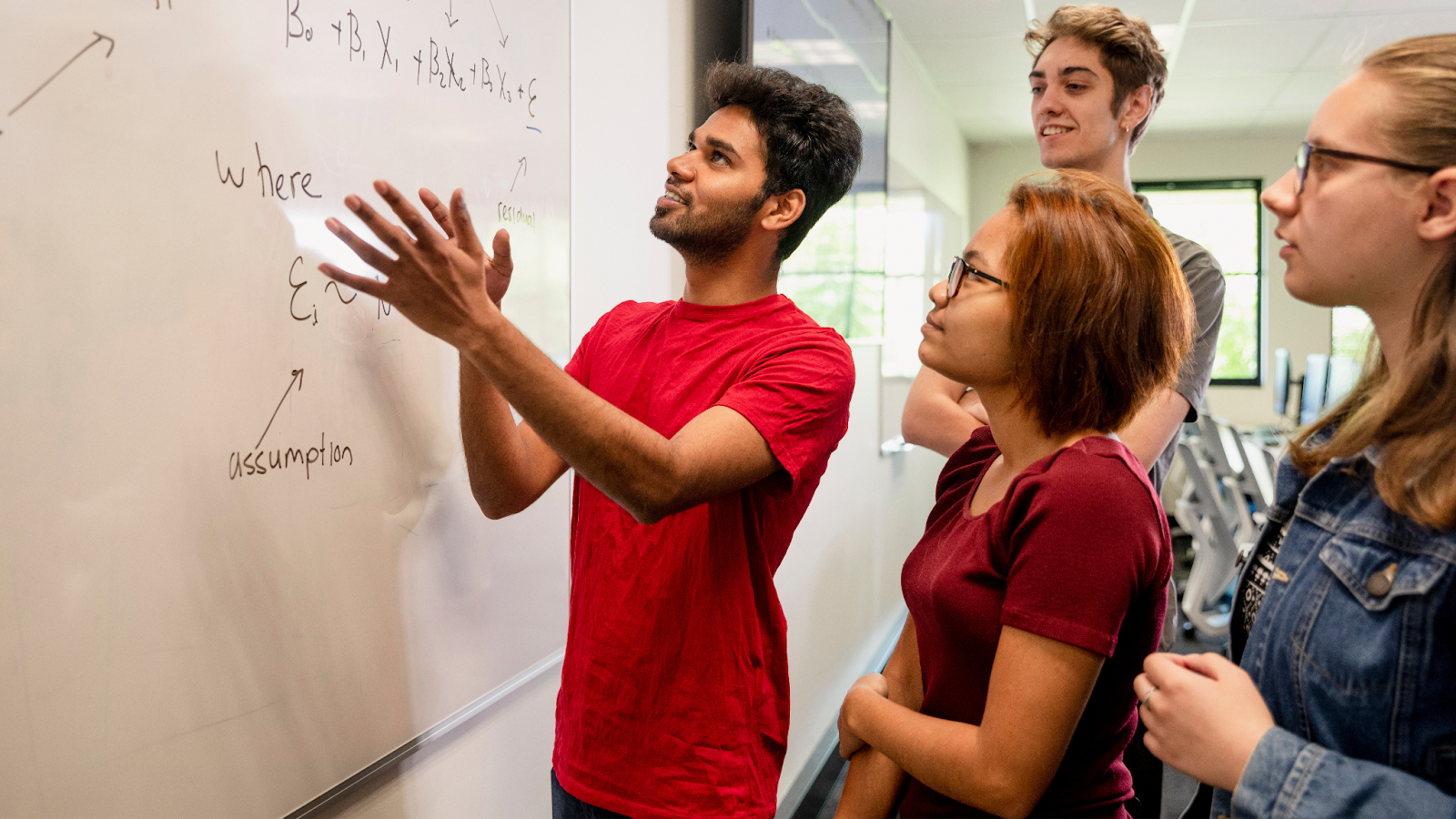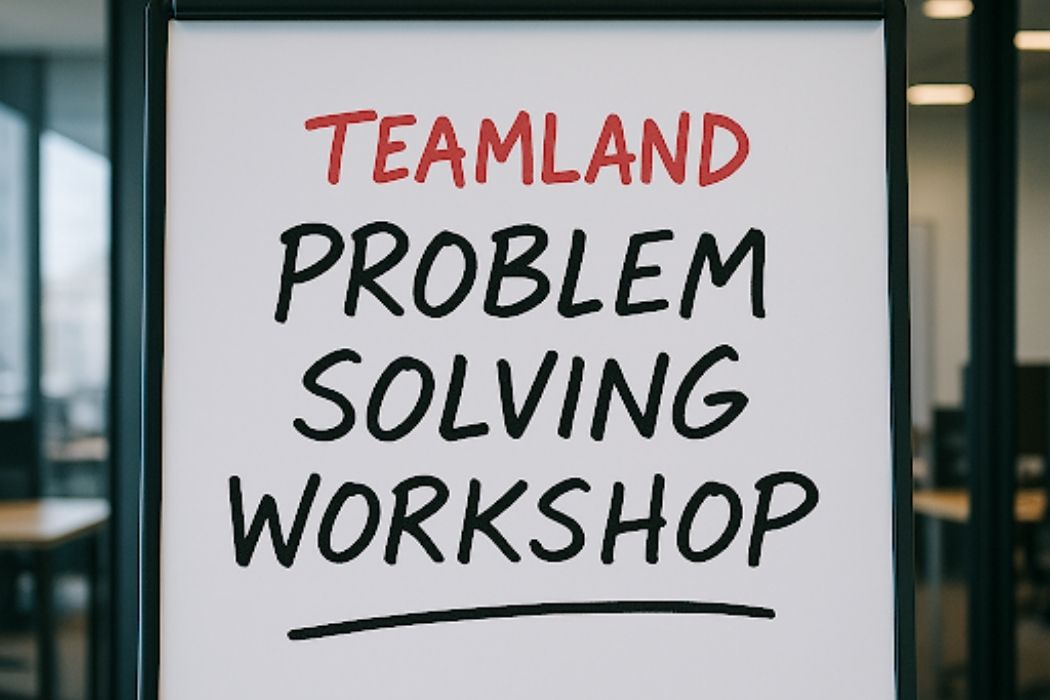Problem-solving workshops have a certain structure and provide the team with an interactive atmosphere in which they may address complex challenges and develop solutions. These types of cultures do not just assist businesses in solving problems at hand, but also inculcate a culture of solving problems, which enhances overall teamwork and productivity.
According to a study published in R&D Management, researchers who underwent Problem Solving Workshops showed measurable enhancements in creativity and work performance, including increased technical reports and service projects.
In this article, we will explore how problem-solving workshops help businesses of all sizes overcome challenges, build critical thinking skills, and implement business problem-solving strategies for long-term success. We’ll dive into the ways Teamland offers these workshops to support businesses and provide valuable solutions.
What is a Problem-Solving Workshop?
A problem-solving workshop is a structured, interactive session where teams collaborate to analyze a specific issue, brainstorm potential solutions, and develop actionable plans to address the problem. These workshops foster critical thinking, creativity, and effective teamwork, providing businesses with practical tools and strategies to overcome challenges and improve overall performance.
Key Steps in a Problem-Solving Workshop

A well-designed workshop follows several essential stages to ensure teams not only generate ideas but also create practical solutions. Here's how the process typically unfolds:
1. Define the Challenge
The first step is to clearly define the problem or challenge you’re trying to solve. Using an open-ended question like “How might we...?” encourages creativity and broadens the possibilities. This phase sets the stage for the rest of the workshop by making sure that the issue at hand is understood from different angles. The more focused the challenge statement, the more targeted and relevant the solutions will be.
2. Idea Generation
Once the challenge is defined, it’s time for divergent thinking, a creative phase where the goal is to generate as many ideas as possible without worrying about feasibility or practicality. This is where the fun begins! Techniques like brainstorming, mind mapping, and role-storming (thinking from someone else's perspective) can help spark creative ideas. The key is to avoid judgment in this stage, encouraging wild and unconventional thoughts to surface.
3. Idea Development
After the team has generated a range of ideas, the next step is to refine and prioritize them through convergent thinking. In this stage, ideas are evaluated based on criteria like feasibility, impact, and alignment with business goals. This is the phase where practicality takes center stage. Teams typically use decision matrices or SWOT analysis to assess which ideas are worth pursuing.
4. Action Planning
Once a promising solution is identified, the final stage of the workshop focuses on action planning. This involves laying out a concrete plan for how to implement the solution. Responsibilities are assigned, timelines are set, and milestones are created to ensure accountability. Without this step, even the most innovative solutions can falter due to a lack of execution.
Skills and Mindsets for Effective Facilitation

For a problem-solving workshop to truly succeed, the facilitator must possess a blend of cognitive and emotional intelligence. Here are some of the key skills and mindsets that a good facilitator needs:
- Openness to Ideas: A facilitator must be open to unconventional solutions and allow participants the freedom to explore a wide range of ideas without judgment.
- Tolerance for Ambiguity: Problem-solving often involves unclear situations, and facilitators need to be comfortable navigating these uncertain moments without rushing to conclusions.
- Critical Thinking: It’s not enough to simply generate ideas, facilitators need to help participants think critically and analyze each idea’s feasibility, risks, and rewards.
- Adaptability: Each team or business challenge is unique, so facilitators must be able to adjust the activities and focus as needed during the session.
By fostering these skills in the workshop, a facilitator helps ensure that the team not only solves the problem at hand but also grows in its ability to handle future challenges independently.
What Makes Problem-Solving Workshops Effective?

Before we explore the specific challenges that workshops can solve, it’s important to understand why problem-solving workshops are so effective in the first place.
Practical Solutions to Real Business Problems
Problem-solving workshops are designed to address real issues businesses are facing. These aren’t just theoretical exercises; they’re about finding practical, actionable solutions that can be implemented immediately.
By addressing current challenges, businesses can apply problem-solving techniques in a controlled and collaborative setting, resulting in tangible outcomes.
For instance, a tech company struggling with poor team communication could organize a problem-solving workshop where teams actively work together to find solutions.
They might create new communication strategies, implement more efficient tools, or even redesign workflows to ensure better alignment. Instead of just discussing the problem, employees are involved in the solution process, making it more likely that those solutions will be executed successfully.
Collaborative Problem-Solving
The true value of problem-solving workshops lies in team collaboration. While individuals can certainly solve problems, group problem-solving tends to lead to more creative, diverse, and well-rounded solutions. Teamland’s workshops emphasize the power of diverse teams coming together to analyze a problem from different angles, each contributing a unique perspective.
By encouraging different viewpoints and brainstorming ideas, these workshops allow teams to come up with solutions they may not have thought of independently. Collaboration helps teams see the bigger picture and consider alternative approaches that might not have been considered before.
Consider a small business facing a stagnating product line.
In a Teamland workshop, employees from marketing, product development, and customer service might work together to find ways to innovate.
The marketing team might suggest new advertising angles, the product development team could propose new features, and the customer service team could provide insights into customer feedback that could spark new ideas.
Business Challenges and How to Overcome Them with Problem-Solving Workshops

Businesses face a wide range of challenges, from internal inefficiencies to external market pressures. Problem-solving workshops are an excellent way to address and overcome these challenges.
Let’s break down some of the most common business problems and see how workshops can provide actionable solutions.
1. Communication Breakdown in Teams
Effective communication is the backbone of any successful organization. Unfortunately, many businesses face communication challenges that lead to confusion, missed opportunities, and frustration. These issues can be particularly damaging when teams fail to align on goals or misunderstand each other’s expectations.
How Workshops Help
Problem-solving workshops focused on communication help businesses break down barriers and create clearer channels for dialogue. In these workshops, employees learn active listening skills, how to give and receive constructive feedback, and how to effectively communicate across departments or teams.
Key Benefits
- Improved Team Alignment: Employees will better understand each other's roles and how to collaborate more effectively.
- Clearer Expectations: Workshops help set clear communication guidelines to ensure everyone is on the same page.
- Reduced Conflicts: By addressing miscommunications early, workshops help reduce workplace tensions and conflicts.
2. Employee Engagement and Retention
Employee engagement and retention remain top priorities for businesses, especially in an age where the job market is increasingly competitive. Employees who feel disengaged or undervalued are more likely to leave, which creates a high turnover rate and disrupts productivity.
How Workshops Help
Problem-solving workshops can tackle engagement issues by helping employees voice their concerns, suggest improvements, and feel empowered to contribute to the business’s success. These workshops provide an open space for team members to discuss what’s working and what’s not, fostering a sense of ownership over the solutions that are developed.
By actively involving employees in problem-solving and decision-making, businesses can improve employee satisfaction and loyalty.
Additionally, workshops that emphasize collaboration help foster a sense of community within the organization, which boosts morale.
Key Benefits
- Increased Job Satisfaction: Employees feel heard and valued, which increases their job satisfaction and loyalty to the company.
- Better Work Culture: Workshops help improve workplace culture by creating a positive, collaborative environment.
- Improved Retention: Engaged employees are less likely to leave, which saves the company money on recruitment and training.
3. Innovation Stagnation
In industries like technology, consumer goods, and manufacturing, innovation is key to maintaining a competitive edge. However, many businesses experience innovation fatigue, where employees feel burnt out or uninspired by the constant pressure to generate new ideas.
How Workshops Help
Teamland’s workshops reignite creativity by pushing employees outside their comfort zones.
Through structured brainstorming sessions, idea generation exercises, and creative problem-solving frameworks like SCAMPER (Substitute, Combine, Adapt, Modify, Put to Another Use, Eliminate, and Reverse), employees are encouraged to think differently and experiment with new ideas.
Workshops dedicated to innovation focus on testing ideas quickly, gathering feedback, and iterating on solutions without the fear of failure. This helps businesses build a culture of continuous innovation where ideas are constantly evolving.
Key Benefits
- Creative Solutions: Teams devise fresh, innovative solutions to longstanding problems.
- Rapid Prototyping: Workshops allow businesses to test ideas quickly and make improvements in real-time.
- Boosted Morale: Employees feel energized by the opportunity to contribute creative ideas and innovate.
4. Customer Satisfaction and Retention
In a competitive market, customer retention is more important than ever. Many businesses find themselves losing customers due to poor service, unaddressed pain points, or a lack of personalization.
How Workshops Help
Problem-solving workshops focused on customer satisfaction allow businesses to dig deep into their customers' experiences. Customer journey mapping, feedback analysis, and role-playing customer scenarios enable teams to understand exactly where customers are dissatisfied and what changes need to be made to improve the experience.
By empowering teams to come up with customer-centric solutions, businesses can increase loyalty, engagement, and retention.
Key Benefits
- Increased Loyalty: Customers who have a positive experience are more likely to return.
- Personalized Service: Workshops help teams identify opportunities for more personalized offerings.
- Enhanced Customer Experience: By addressing common customer pain points, businesses can significantly improve customer satisfaction.
Teamland's Problem-Solving Workshop
Our problem-solving workshop helps businesses tackle challenges through a structured, collaborative approach. These workshops focus on identifying issues, generating ideas, and creating actionable solutions, all while building essential problem-solving skills in the team.
Workshop Structure
- Problem Definition: The workshop starts by defining the challenge clearly, ensuring alignment among participants.
- Idea Generation: Teams brainstorm and use techniques like mind mapping to generate diverse solutions.
- Solution Refinement: The best ideas are selected, evaluated, and prioritized based on feasibility and impact.
- Action Plan: A detailed action plan is created, outlining steps, responsibilities, and timelines for implementation.
Why Teamland’s Workshops Stand Out
- Tailored to Business Needs: Each workshop is customized to address the specific challenges a business faces.
- Collaborative: Emphasizes teamwork and collective problem-solving.
- Immediate Application: Solutions are directly applicable to real-world business issues.
- Skill Development: Employees improve skills like critical thinking, communication, and collaboration.
The Long-Term Impact of Problem-Solving Workshops
Problem-solving workshops aren’t just quick fixes for immediate problems. They transform the way teams and businesses think about challenges. By creating a structured environment for problem-solving, businesses not only solve existing issues but also lay the groundwork for tackling future challenges effectively.
Let’s explore how problem-solving workshops create long-term benefits.
1. Building a Proactive Problem-Solving Culture
One of the most valuable long-term outcomes of problem-solving workshops is the creation of a proactive problem-solving culture within the organization. When employees are trained to think critically, ask the right questions, and collaborate effectively, problem-solving becomes second nature.
Teams don’t wait for problems to escalate; they anticipate issues early on and take steps to address them before they grow into significant challenges.
How Workshops Foster a Proactive Culture
- Encourage Early Identification of Issues: Employees are taught to identify potential challenges early, which helps prevent problems from escalating.
- Promote Continuous Improvement: Workshops emphasize the importance of constant reflection and improvement, ensuring teams are always looking for ways to optimize processes and workflows.
- Empower Employees: Teams that solve problems together feel more ownership over their solutions and outcomes, leading to a culture of continuous innovation.
2. Enhancing Team Collaboration and Alignment
When employees are trained together in problem-solving, it enhances the collaborative capabilities of the entire team. Workshops provide a platform for people from different departments, skill sets, and experiences to work together on common problems, fostering a collaborative environment that is essential for business success.
Benefits of Team Collaboration Workshops
- Improved Cross-Department Communication: When teams work on problems together, they gain a deeper understanding of each other’s roles and challenges.
- Increased Trust: Problem-solving workshops often involve interactive exercises that encourage teams to rely on one another’s strengths. This builds mutual respect and trust, which is crucial for long-term success.
- Shared Goals and Vision: Workshops ensure that all team members are aligned with the company’s vision and goals, promoting shared ownership of problems and solutions.
3. Creating an Innovation-Driven Business
Innovation is the key to staying competitive. Problem-solving workshops don’t just solve current problems; they also spur new ideas that drive innovation. By encouraging employees to think creatively and work together to solve challenges, businesses can develop new products, improve existing services, and find more efficient ways of doing business.
How Workshops Encourage Innovation
- Brainstorming and Creative Problem-Solving: Workshops often include structured brainstorming sessions where participants come up with out-of-the-box solutions to problems.
- Prototyping New Ideas: Teams are encouraged to test their ideas quickly through prototyping and feedback loops.
- Iterative Solutions: Workshops emphasize the importance of testing, iterating, and improving solutions, leading to more innovative outcomes.
4. Improved Decision-Making Skills
Decision-making is one of the most critical aspects of business success. Poor decisions can lead to financial losses, inefficiency, and missed opportunities. Through problem-solving workshops, employees develop their ability to make informed decisions based on data, analysis, and collaborative input.
These workshops also teach participants how to evaluate risks, consider long-term outcomes, and involve team members in the decision-making process, ensuring a well-rounded approach to tackling challenges.
How Workshops Help Improve Decision-Making
- Risk Assessment: Participants are taught to evaluate risks and consider the potential impact of decisions before taking action.
- Cost-Benefit Analysis: Workshops focus on tools like decision matrices and cost-benefit analysis to ensure that decisions are made with the full picture in mind.
- Scenario Planning: Teams practice decision-making in simulated scenarios, allowing them to experience and learn from different outcomes.
5. Increased Employee Satisfaction and Engagement
When employees are actively involved in solving problems and contributing to business solutions, they feel a sense of ownership and empowerment. This increased engagement leads to higher job satisfaction and a more motivated workforce.
How Workshops Improve Employee Engagement
- Employee Involvement: Problem-solving workshops provide employees with the chance to have a voice in shaping company decisions and outcomes.
- Skill Development: Employees gain valuable skills in areas like critical thinking, creativity, and collaboration, which leads to personal growth.
- Recognition: Successful problem-solving solutions are often celebrated in workshops, giving employees a sense of accomplishment.
6. Better Adaptability to Change
In business today, being able to adapt is key. If you’re not flexible and willing to change, you’ll fall behind. Problem-solving workshops help teams not just fix problems but also stay on their toes and keep getting better.
How Workshops Build Adaptability
- Learning by Doing: Workshops provide employees with opportunities to experiment and adapt their solutions based on real-time feedback.
- Flexible Problem-Solving Frameworks: Workshops introduce flexible frameworks like design thinking and agile methods, which can be applied in a variety of situations.
- Building Resilience: Teams learn to bounce back from failures, adapt their strategies, and keep moving forward.
Conclusion
Problem-solving workshops offer businesses more than just a quick fix to their problems; they provide a pathway to long-term success. By fostering a culture of proactive problem-solving, collaboration, and continuous improvement, businesses can tackle any challenge that comes their way. From enhancing decision-making skills to fostering innovation, the benefits of these workshops are far-reaching.
They also help create a foundation for future challenges, enabling teams to work more effectively together in high-pressure situations. By investing in Teamland’s problem-solving workshops, businesses don’t just overcome their current challenges; they build a sustainable problem-solving culture that supports long-term growth, employee engagement, and market competitiveness, ensuring they stay ahead in an ever-changing market.
Plan your experience with Teamland today
FAQs
1. What challenges can be addressed through business workshops?
Business workshops are effective in tackling a variety of challenges, including poor communication, lack of team alignment, and operational inefficiencies. They help businesses improve cross-departmental collaboration, address employee engagement and retention issues, and overcome innovation stagnation. These workshops also aid in solving customer satisfaction problems by helping teams identify pain points and find ways to improve processes.
2. Can workshops help in improving decision-making in business?
Yes, business workshops can significantly improve decision-making by equipping employees with tools and frameworks to make informed decisions. Through activities like decision matrices, cost-benefit analysis, and scenario planning, participants are trained to evaluate options systematically, assess risks, and choose the best course of action.
3. How often should businesses conduct problem-solving workshops?
The frequency of problem-solving workshops depends on the specific needs of the business. For most organizations, holding workshops every quarter can help maintain focus on continuous improvement and address emerging issues. For businesses undergoing rapid changes or facing recurring challenges, workshops should be conducted more frequently, potentially on an as-needed basis or annually, to evaluate progress.
4. How do you measure the success of a problem-solving workshop?
The success of a problem-solving workshop can be measured through pre- and post-workshop surveys that gauge improvements in participants' skills, confidence, and understanding of key concepts. Additionally, measuring the implementation of solutions developed during the workshop is a clear indicator of success. If the proposed solutions resolve the original problem and lead to measurable outcomes like improved productivity, reduced costs, or increased customer satisfaction, the workshop can be considered successful.
5. What types of businesses benefit most from problem-solving workshops?
Startups and small to medium-sized businesses (SMBs) benefit greatly from problem-solving workshops as they often face limited resources and need efficient, innovative solutions to grow and scale. Customer-facing businesses, such as those in retail, hospitality, and e-commerce, also see significant advantages by improving customer service and satisfaction. Additionally, businesses in industries like technology, manufacturing, and healthcare, where operational efficiency and innovation are critical, can leverage these workshops to improve team collaboration, streamline processes, and stay competitive in the market.







